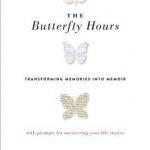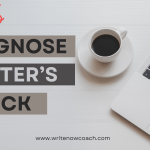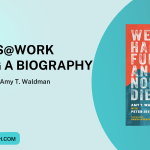The Push and Pull of Writing Prompts
May 29, 2018

The Push and Pull of Writing Prompts
By Christi Craig
I have a love-hate relationship with writing prompts.
On one hand, I see them as a critical component to the work. They serve as warm-ups in each of the classes I teach, as a way for participants to engage with the topic or lesson. Sometimes they work simply to get the ink in their pens flowing, to free the mind of anxiety before we dive into the real work. On the other hand, they can feel like torture. Give me a prompt and a blank page and 10 minutes (or even 30), and putting anything on paper can feel like pulling teeth, without the Novocain. But 9 times out 10, prompts are working just as they should.
On the surface, a successful prompt sparks the beginning of a beautiful piece. In some cases, prompts even yield a complete (and print-worthy) story or essay in 10-minutes or less. It’s true; I know this from experience. Some of my early-published works appear in a tiny collection called, On the Fly: Stories in Eight Minutes or Less. This whole anthology grew from one online course I took with several other women, who experienced just that: prompts and sparks and magic, and whole stories that blossomed from writing with reckless abandon for less time than it takes to boil an egg.
Behind the scenes, prompts push the writer, in process or in performance. Here’s where the torture comes into play. Nobody likes to be pushed, especially a writer (okay, this writer). We want flow and ease and an outpouring of words. But when we sit and stare and words won’t budge, it doesn’t mean the prompt is a bust.
I have a stack of books on prompts. On occasion I search through the pages for some seed of an idea for a blog post or an essay, and I flip through from beginning to end and back again like I scroll through Netflix: Boring, Too sad, Seen it before, I have no idea what that word even means. Endless options; zero inspiration. Still, for one reason or another—because I am the teacher, because I need to write a blog post, because I am desperate to write something—I choose one. I break out the notebook. I click the pen.
I fight the page.
But even in that moment, as long as I’m willing, the prompt works. Maybe I set the timer and end up with a story about the frustrations of the writing process, a list of phrases that look to be sinking material but stand out later as key for some other piece. Maybe I set the timer and in that short 8 to 10 minutes, I have successfully quieted my inner editor so that I can move on to the essay or manuscript I really want to tackle. Perhaps in that moment of willingness I have relaxed enough to discover a new story in the waiting.
This happened to me recently. I wrote on the prompt, walking the dog, and just so you know I am not a dog person. I am not a cat person. I am not a fur person. I am a Zyrtec, eye drops, incessant sneezing person. So this was not an easy prompt. I wrote anyway, even about the fact that I only love dogs at a distance. And what began as “walking the dog” ended in a tiny essay on space, the visible and the invisible, and being in the thick of it. Space and place show up often in my writing, and any day (or exercise) where I can explore that idea in depth is a good day.
So love them or hate them, there is no prompt that fails. Not really. It’s all about perspective; it’s all about the purpose. We turn to prompts because the instructor of the class says we have to; we pick up a book on prompts because we are in need of an idea; we build on one prompt and then another as a way to develop story or character or setting.
Most of the time, the initial sit down warrants an eye roll or a heavy sigh or a tap-tap-tap of the pen, a flurry of brain activity about our to-do list undone or insults from our inner editor. But follow the prompt anyway. There are no hard and fast rules to break; there are no expectations of publication in quick writing prompts. There is only the opportunity to toss words around, chew on ideas, let go and let yourself be surprised.
Places where you can find prompts
 +The Butterfly Hours: Transforming memories into memoir by Patty Dann: a book with brief essays by Dann, one-word prompts, and examples of how her students have approached the prompts, how a prompt can take a writer in an unexpected direction.
+The Butterfly Hours: Transforming memories into memoir by Patty Dann: a book with brief essays by Dann, one-word prompts, and examples of how her students have approached the prompts, how a prompt can take a writer in an unexpected direction.
+Everyday Writing: Tips and Prompts to fit your regularly scheduled life by Midge Raymond. This book has a whole section dedicated to five-minute prompts, fifteen-minute prompts, situational prompts, and weekend writing prompts.
scheduled life by Midge Raymond. This book has a whole section dedicated to five-minute prompts, fifteen-minute prompts, situational prompts, and weekend writing prompts.
+Your favorite book of poetry or your most recent memorable read (choose a line or 1st sentence and start from there); news headlines; the classifieds; Instagram photos. Prompts are everywhere.
And here. Choose one:
Walking the dog.
In the thick of it.
On the fly.
Set your timer for 10 minutes, crack open that notebook, and go.
 About the author. Christi Craig lives in Wisconsin, working by day as a sign language interpreter and moonlighting as a writer, teacher, and editor. Her stories and essays appear online and in print, and she received an Honorable Mention in Glimmer Train’s Family Matters Competition. Once a month, she facilitates a Study Hall: #AmWriting prompt-based workshop where writers meet two hours to talk briefly about craft and incorporate different techniques designed to get pens moving. The next session is scheduled for Sunday, June 3rd, 3-5pm CST. The best part? You can meet online or in person. Visit her website at christicraig.com for more about the Study Hall, her other online courses, or her published work.
About the author. Christi Craig lives in Wisconsin, working by day as a sign language interpreter and moonlighting as a writer, teacher, and editor. Her stories and essays appear online and in print, and she received an Honorable Mention in Glimmer Train’s Family Matters Competition. Once a month, she facilitates a Study Hall: #AmWriting prompt-based workshop where writers meet two hours to talk briefly about craft and incorporate different techniques designed to get pens moving. The next session is scheduled for Sunday, June 3rd, 3-5pm CST. The best part? You can meet online or in person. Visit her website at christicraig.com for more about the Study Hall, her other online courses, or her published work.














